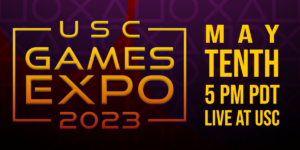
Mike Zyda: New programs will speak to game makers’ needs
Dean Yannis Yortsos of the USC Viterbi School of Engineering announced today two new degrees: a B.S. in Computer Science (Games) and an M.S. in Computer Science (Game Development). The Viterbi School is the first engineering school to offer both.
The Viterbi School’s Information Science Institute has long been intimately involved with the effort to develop games research and education at USC.”These are timely specializations in important areas, including the growing field of serious games. We have been very pleased with the reception we have received so far,” said Yortsos.
Computer Science Department Chair Gérard Medioni explained the background. “Beyond their creative element, videogames offer a major challenge in bringing together numerous core areas of advanced computer science, including artificial intelligence, graphical interfaces, modeling, algorithm design, and of course programming,” he said. “These programs are good academics.”
Medioni worked for more than a year to shepherd the new degrees through USC curriculum committees and on to final approval by USC Provost C.L. Max Nikias. “Training curricula increasingly exist in academia in the dramatic and artistic aspects of games, but remain extremely scarce for the nuts-and-bolts coding that make games work,” he commented. “We know we have students who want this training, and we know that a $45-billion industry is looking for these skills.”
Mike Zyda, director of the Viterbi School’s GamePipe Laboratory , which already offers 15 computer science game courses, points to a recent analysis of skill demand in the industry.
By 2007, the number of employees is expected to double, with roughly the following demand: 65% programmers, 30% artists, and 5% designers. “Our new B.S. and M.S. programs will speak precisely to these needs,” he said.Zyda is the author of an article, “Educating the Next Generation of Game Developers ,” in the current (June) issue of IEEE Computer Science, which details the lessons learned in GamePipe’s recent experience offering computer science-oriented courses in games.
The article speaks of existing relations to other USC schools that will continue. “The new Viterbi School B.S. and M.S. degree programs will interact synergistically with the B.A. and M.F.A. game degrees now offered by the USC School of Cinema-Television Interactive Media program, with engineers taking CNTV courses and vice- versa,” Zyda said.
The syllabus also looks forward to increasing ties with the USC Roski School of Fine Arts‘ developing programs in game art and design, as well as the USC Annenberg School for Communication’s substantial work on the social, communications and other impacts of games upon society and media, carried out in its Annenberg Studies on Computer Games (ASC) center.
“Because USC places such emphasis on multidisciplinary cooperation, it is the ideal place to pioneer tthese computer science degrees,” said Yortsos. “I look forward to a commencement soon when I will hand the first CS (Games) graduates their diplomas.”
This day will come much sooner than 2010 because games CS course have been offered through GamePipe for several years. Medioni estimated the first B.S. and M.S. degrees would be forthcoming by 2008, or possibly even sooner.
Complete information about the new degrees, including requirements and course descriptions, can be accessed through the GamePipe site, for both the Bachelors and the Masters programs.
Background note: The Chronicle of Higher Education, in a February 4, 2005 story, reported on video game programs at a number of schools, including Carnegie-Mellon, Mt. Sierra College, Worcester Polytechnic, the Art Institute of Washington, M.I.T., Stanford, Full Sail Real World Education of Winter Park, FL., and DigiPen Institute of Technology, in Redmond, WA, as well as Southern Methodist University’s new four-year undergraduate degree in videogame design. Most are not based in computer science. Carnegie-Mellon’s M.S. program in entertainment technology is offered jointly by the C-M’s art and computer science departments but does not have a B.S. component. The University of California Santa Cruz department of computer science recently announced plans to offer a B.S. degree.ar undergraduate
Published on June 20th, 2006
Last updated on August 9th, 2021












